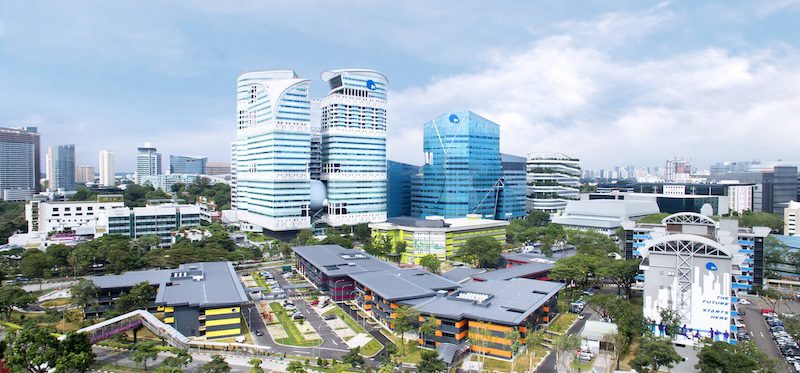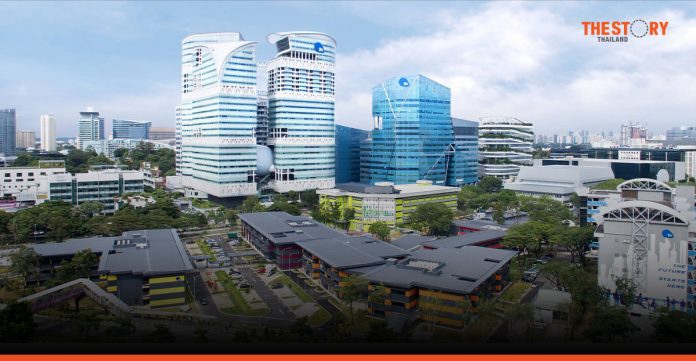Due to its small size and limited natural resources, Singapore may not be an ideal place for mass production to make prices competitive. But other countries in Southeast Asia and other parts of the world have some things — if not many — to learn from this island state.
For several decades, Singapore has focused on research and development for innovative products and technologies. The country makes up for its shortcomings in size with strong performance in high-tech R&D.
Singaporean officials working on tech R&D planning say the country’s R&D capabilities in science and technology play a key role in boosting its competitiveness.
Twofold strategy to build R&D capabilities

“Science and technology has enabled Singapore to remain economically competitive whilst addressing our national needs,” said Professor Subodh Mhaisalkar, Executive Director of Academic Research at Singapore’s National Research Foundation (NRF).
“We have a twofold strategy for building our R&D capabilities. Firstly, we nurture foundational research that can spark new growth opportunities. Secondly, we build on our existing strengths to develop excellence in areas where we can achieve global impact, such as artificial intelligence, cancer research, and quantum technologies,” he said.
NRF develops policies, plans, and strategies for Singapore’s research investments. It also promotes interdisciplinary R&D across Singapore’s higher learning institutes and supports collaborative efforts with top global universities, innovators, and corporates.
Singapore’s R&D ecosystem is greatly enriched through the robust exchange of knowledge across multiple domains, according to Prof Mhaisalkar. “Such research findings would better support the translation of solutions to pressing real-world concerns such as climate change, food and energy security, and infectious diseases,” he said.
“This framework informs Singapore’s R&D approach and has enabled us to punch above our weight in the global science and technology landscape.”
Bridging gap between academia and industry
Irene Cheong, Executive Director of Innovation & Enterprise Group at the Agency for Science, Technology and Research (A-STAR), points to three measures that help Singapore to stay ahead globally in R&D:
1. Focusing on economic and societal outcomes from research
2. Collaborating through public-private R&D partnerships
3. Sustaining a strong pipeline of local and international R&D talent.
“A-STAR, as the lead public sector R&D agency in Singapore, drives mission-oriented research that creates economic growth and jobs for Singapore, and contributes to societal benefits such as improving outcomes in healthcare, urban living, and sustainability,” Cheong said.
She said A-STAR, an agency under Singapore’s Ministry of Trade and Industry, bridges the R&D gap between academia and industry by engaging industry early to identify new technology areas for commercialization and productization opportunities.
“We have varying collaboration models to work with selected partners to co-develop deep-tech products, license technologies or intellectual properties, and build startups. In all these models, public-private partnerships are key, with R&D collaborations between universities, public and private research institutions, and industry. This synergy fosters practical applications of research findings and allows for the rapid translation of research into commercial products and services,” Cheong said.
Regarding R&D talent, she said A-STAR believes in fostering a strong core of Singaporean research talent, complemented by a rich diversity of international researchers.
“An emphasis on STEM (Science, Technology, Engineering, Mathematics) through education and outreach is important. A-STAR has scholarships and career pathways that contribute to sustaining such a diverse pool of local and international talent. This brings fresh perspectives and expertise and helps maintain the vibrancy of the R&D landscape.”
‘Government is an important enabler’
The Singaporean government builds an ecosystem for deep tech partnerships, which allows innovative start-ups, big corporates, venture capitalists, and government agencies to tap into each other’s strengths and accelerate the path to achieving breakthroughs, according to Deputy Prime Minister Heng Swee Keat of Singapore.
“The government is an important enabler. It must provide adequate support for research in our universities and research institutes, and in companies based here,” he said.
“While Singapore has a small domestic market, we are deeply connected to the region and the world,” said Heng, who also doubles as the coordinating minister for economic policies.
He was speaking during the opening of the Singapore Week of Innovation and Technology (SWITCH), which was organised by Enterprise Singapore — a government agency championing enterprise development in the island state.
SWITCH 2023, held at the Marina Bay Sands Expo and Convention Centre from October 31 to November 2, drew about 15,000 participants and some 350 exhibitors from the global technology and innovation community. Asia’s leading startup festival, SWITCH is in its eighth edition this year.
Massive investment in R&D
According to the deputy PM, Singapore has invested billions of dollars in R&D since the 1990s, committing US$18.3 billion (665 billion baht) to support research and innovation work between 2021 and 2025.
In 2022 alone, Singapore-based tech startups raised close to US$11 billion (400 billion baht). The island state is now home to about 4,500 tech startups, supported by a network of more than 400 venture capital firms and 220 incubators and accelerators.
Deep tech investments in Singapore almost doubled between 2020 and 2022, Heng said.
Tech startups saw healthy investments between 2019 and 2022 although the deal value and volume dropped when the Covid-19 pandemic struck in 2020, according to Enterprise Singapore.
The deal value was US$7.3 billion in 2019, $4.1 billion in 2020, $11.3 billion in 2021, and $10.9 billion in 2022. Startup funding deals totalled 592 in 2019, 528 in 2020, 730 in 2021, and 651 in 2022.
Enterprise Singapore has helped the island state build a vibrant and robust startup ecosystem – with over 4,500 tech startups, 240 incubators and accelerators, 440 venture capitalists, as well as several co-working spaces and innovation-ready corporates.
A leader in global innovation
Singapore is recognized internationally for innovation. It is ranked number 1 among Asian countries and number 5 in the world in the Global Innovation Index 2023. The world’s top 10 most innovative economies, according to the Global Innovation Index, are Switzerland, Sweden, the United States, the United Kingdom, Singapore, Finland, Netherlands, Germany, Denmark, and South Korea.
Singapore is also ranked first among Asian nations and number 6 in the world in the Global Startup Ecosystem Index 2023. Also, the island state is number 1 among Asian cities and number 8 in the world in the Global Startup Ecosystem Report 2023.





